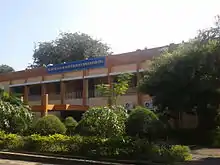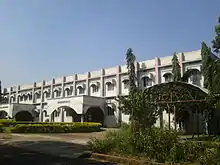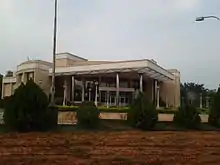Puducherry Technological University
Puducherry Technological University, formerly Pondicherry Engineering College was established in 1984 by MHRD, Government of India under the Seventh Five Year Plan to meet the requirement of an engineering institution in the Union Territory of Puducherry. Ever since its inception, the college has maintained a steady academic and research growth both vertically and horizontally with an aim to offer quality technical education and cater to the diverse requirements of the industries besides the expectation of the prevailing societal system. Eight UG and nine PG programmes in core engineering disciplines besides MCA and Ph D programmes in all engineering disciplines and basic sciences are currently offered in the college. As the first engineering college in the Union Territory of Puducherry, it preserves its uniqueness among all professional institutions which were started later. The college enjoys significant autonomy for administration. The college initially affiliated to Pondicherry University, has been granted ‘permanent affiliation’ as the first and significant step towards attainment of academic autonomy and obtained Autonomous status from 2014-15 onwards.
புதுச்சேரி தொழில்நுட்ப பல்கலைக்கழகம் | |
Former name | Pondicherry Engineering College(PEC) |
|---|---|
| Motto | Prosperity Through Technology |
| Type | Public |
| Established | 1984 under VII Five Year Plan |
| Affiliation | Pondicherry University |
| Chancellor | Kiran Bedi |
| Principal | S. Kothandaraman |
| Undergraduates | 1,700 |
| Postgraduates | 300 |
| Location | , 12°00′47.74″N 79°51′13.78″E |
| Campus | 280 acres (1.1 km2) |
| Website | http://www.pec.edu |
The major strengths of the institution are its location, well-connected by land and (upcoming) air routes to major cities in India, highly qualified faculty and adequate infrastructure. The college, preserving its brand name, attracts the meritorious students of UT of Puducherry in addition to students from neighboring states. The placement of students through campus is progressive since inception. Considering all these aspects, the strategic plan for institutional development for has been prepared with the following specific vision: “To transform this technical Institute into a Technological University with greater autonomy and evolve the university as educational institution of national importance and global eminence”.
Location
The campus is situated at Pillaichavady, which is about 12 km from the railway station and bus-stand in Pondicherry. It is about 150 km south of Chennai (Madras) on the shores of Bay of Bengal.

Campus
The 240 acres (0.97 km2) of the campus has departmental buildings, an auditorium, library, hostels, students' amenities centre, open-air theatre, residential quarters for staff and laid out with roads, lawns and gardens.A central library with over 48000 books, 72 national journals, 98 international journals and INDEST (Indian National Digital Library of Science and Technology) facility is available for the use of staff and students.
Besides this there is a well furnished guest house and a well equipped dispensary are available. a well planned fibre-optical campus network with 12 Mbit/s leased line internet connectivity is available in the campus.
The institute has 2 basketball courts, one football ground and one cricket ground.
Departments

There are 12 departments:
- Department of Electronics and Communication Engineering
- Department of Electrical and Electronics Engineering
- Department of Computer Science and Engineering
- Department of Information Technology
- Department of Electronics and Instrumentation Engineering
- Department of Chemical Engineering
- Department of Mechanical Engineering
- Department of Civil Engineering
- Department of Mathematics
- Department of Physics
- Department of Chemistry
- Department of Humanities and Social Sciences
Student life

Students' Councils
Each department has its own students' council organising various conferences, workshops and seminars on the cutting-edge technologies, to teach students the latest trends in their field. The councils also encourage students to conduct various online and offline events to help them network with staff and fellow students.
Cybrus
Cybrus is a symposium conducted by student's council of the computer science department. Cybrus 2k20 was conducted with the participation of more than 1000 students from different colleges.
Revelation
Revelation is a Quadrennial Technical festival of the department of Electronics and Instrumentation Engineering, managed by the student council of EIE, fusion. It showcased various creative and technical ideas of students from all over India.
Mechnium
Mechnium is a Quadrennial Technical festival organised by the students of the Mechanical Engineering department on behalf of the Department of Mechanical Engineering. The latest version of Mechnium was named Mechnium 2K18. It hosted more than 500 participants from more than 100 colleges. MECHNIUM 2K18 featured a paper presentation competition, robo wars, a technical quiz, a poster presentation, and a design competition. It also hosted a technical workshop on the latest topics of mechanical engineering.
Intronix
Intronix is an annual inter collegiate technical festival organised by students of the electronics and instrumentation engineering department of PEC. The fest was launched to encourage interest in robotics and technology. A wide range of competitions, workshops and events are organised every year to familiarize students with new technologies.
Marakriti
Marakriti (robot in Sanskrit), the school's robotics club, was started on the year 2009. Housed in EIE department it is one of the premier robotics club of Pondicherry. The goal of Marakrithi is to boost interest in the cross discipline areas of robotics, including mechanical engineering, electronics, and software development.
PEC Alumni Association (PECAA)
The Alumni Association is formed to provide a forum for the students who have graduated to keep in touch with each other and with the Alma Mater. The membership is open to all graduates. It is obligatory for every student to become a life member of the association by payment of Rs.100 at the time of admission. The faculty is its honorary members. An Executive Committee elected by the General Body at its annual meeting manages the office of the Alumni Association.
Rankings
| College rankings | |
|---|---|
| Engineering – India | |
| NIRF (2020)[1] | 122 |
Pondicherry Engineering College was ranked 122 among engineering colleges by the National Institutional Ranking Framework (NIRF) in 2020.[1]
See also
References
External links
| Wikimedia Commons has media related to Pondicherry Engineering College. |
